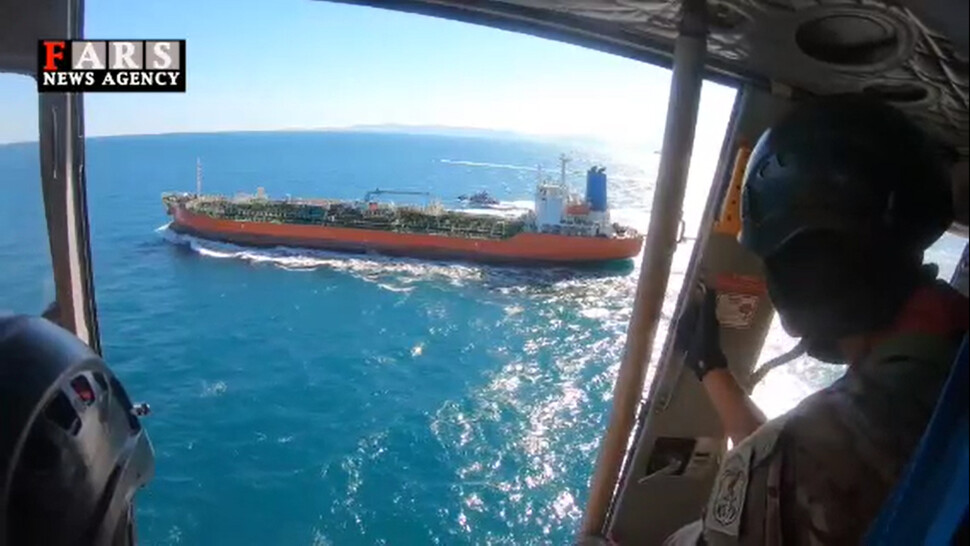
On the 4th (local time), the Iranian Revolutionary Guards released a video of the process of capturing the Korean national ship’Korea Chemi’ (17,426 tons) in the Hormuz Strait, a major crude oil transport route in Middle Eastern oil producing countries. The video, which is believed to have been shot from a helicopter, includes a scene of a small high-speed boat belonging to the Iranian Revolutionary Guard approaching the Korean chemistry. FARS news video capture
Is it a’technical measure’ for marine pollution, or a’meaning pressure’ to return detained assets? If not, would it be entangled in a’strategic conflict’ between the US and Iran? On the afternoon of the 4th, Iran’s’unusual’ action of capturing the Korean chemical carrier’Korea Chemi’ (17,426 tons) is attracting extraordinary attention to the background. This is the day Iran started working to raise the uranium enrichment level to 20%, despite the concerns of the international community. The solution to the situation is inevitably different depending on what Iran really is. The diplomatic authorities of South Korea and Iran side by side announced their official position that the capture is a’technical measure’ related to marine pollution. Foreign Ministry spokesman Choi Young-sam said at a regular briefing on the 5th, “High-ranking officials from the Iranian Ministry of Foreign Affairs and others are making it clear that’this case is simply a technical issue’. “The Ministry of Foreign Affairs will aim to release our ships and crew early in the earliest possible time.” Iranian Foreign Ministry spokesman Said Hativjade said in a statement released on the website the day before, “This issue is completely technical. It was because the ship polluted the sea.” In the afternoon, Iranian Ambassador to Korea Said Badamchi Shavestari, who was invited to the Ministry of Foreign Affairs, confirmed that the sailors were in a safe state. Following the dispatch of the Navy’s Cheonghae unit Choi Young (4400t class) to the Strait of Hormuz, the government is planning to dispatch a delegation headed by the head of the African Middle East Bureau of the Ministry of Foreign Affairs Ko Gyeong-seok. It is expected that the first Vice Minister Choi Jong-gun will be sent to the local area on the 10th to try to resolve the situation early. If the’technical’ problem is the cause as explained by the two governments, the situation can be resolved smoothly. However, some argue that there is a more complex background. Iran’s dissatisfaction with the export proceeds of Iranian crude oil, which Korea is seizing, was the direct or indirect cause of the incident. Since 2010, Korea and Iran have been making trade settlements in won through the accounts of the Iranian Central Bank opened in Korea. However, when the United States selected Iran as a Specially Designated International Terrorist Organization (SDGT) in September 2019, trade between the two countries was virtually stopped. As a result, about 7 billion dollars (about 7.76 trillion won) is tied to Korea. Iran, which is suffering greatly from US economic sanctions, has strongly requested the return of funds by appealing to the International Court of Justice (ICJ) in July of last year, saying that it can sue the Korean government. In this regard, an official from the Ministry of Foreign Affairs said, “Iran received special approval from the US Treasury after consulting with the United States on how to secure a’Covax Facility’ vaccine (an international project for jointly purchasing a Corona 19 vaccine) with frozen funds in Korea. However, when the money is converted into dollars during the remittance process, the money goes to the US bank. In this process, the Iranian government has not yet made a decision because of concerns that the US government does not know what to do with the money.” Iranian government spokesman Ali Ravieri said at a press conference on the 5th that when asked, “Are you holding Korean sailors hostage? If there is a hostage play, it will be the Korean government that freezes our money of 7 billion dollars without grounds.” Left. The international community, including the United States, is looking into this situation with a more serious look. Due to the Trump administration’s “maximum pressure” policy, the United States and Iran are in conflict. The 3rd, the day before the seizure, marked the first anniversary of the assassination of the U.S. commander of the Kuds Army of the Iranian Revolutionary Guard, Gasem Soleimani, who was revered as a “hero of Iran” through a drone attack. It was killed by an alleged Israeli Mossad. As hard-line public opinion insisting on’retaliation’ intensified, Iran’s top leader, Ayatollah Ali Hamenei, said, “We will carry out retaliation for the assassination.” Shortly thereafter, on December 20th, a “suspicious” rocket attack, believed to have been aimed at the US embassy, was launched in Baghdad, Iraq. The United States later launched the B-52, a strategic bomber capable of carrying nuclear weapons, in the Persian Gulf three times, and dispatched nuclear submarines Georgia and the carrier Nimitz to contain Iran. In the midst of such a’bloody confrontation’, Iran showed off its ability to block the Strait of Hormuz, where 30% of the world’s crude oil traffic flows. Even more worrisome is the fact that Iran resumed production of uranium with a concentration of 20% (highly enriched uranium for weapons is more than 90%) on the day of the ship’s capture. Iran has maintained this framework even after the Trump administration unilaterally broke the Iran Nuclear Agreement in May 2018, but now it has crossed the line. Joe Biden, who has said, “I will return to the nuclear agreement after taking office,” is undertaking a’strategic provocation’ against elected Joe Biden. An official from the Ministry of Foreign Affairs also said, “We are grasping (Iran’s intention) in consideration of various scenarios and circumstances. It is too early to predict.” By Gil Yoon-hyung, staff reporter [email protected]
